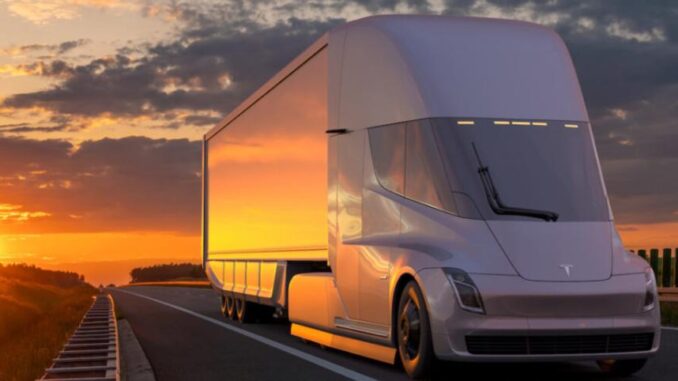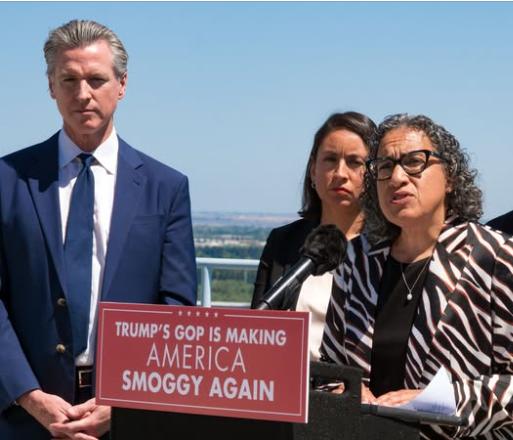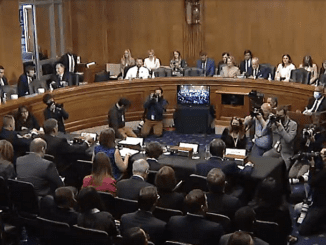
WASHINGTON, DC, June 1, 2025 (ENS) – President Donald Trump is expected to sign two Congressional resolutions that will revoke the U.S. Environmental Protection Agency waivers from federal standards for California car and truck emissions rules.
Besides the Advanced Clean Trucks rule, Congress also revoked waivers for California’s Advanced Clean Cars II rule and its Heavy-Duty Engine Omnibus NOx rule.
Under the Clean Air Act of 1970, California’s emissions regulator, the California Air Resources Board, CARB, must request and receive an EPA waiver for each state regulation that exceeds federal standards.
The Advanced Clean Trucks rule is a manufacturers sales requirement for zero emission vehicles and a one-time reporting requirement for large fleets. It would require the majority of Class 8 big-rigs sold in California to be zero-emission vehicles by 2035.
The Advanced Clean Cars II regulations take the state’s growing zero-emission vehicle market and robust motor vehicle emission control rules and augments them to meet more aggressive tailpipe emissions standards and ramp up to 100 percent zero-emission vehicles. By 2035 all new passenger cars, trucks and SUVs sold in California will be zero emissions, says CARB.
The EPA’s California waiver for the Advanced Clean Cars II regs allows California, and the 11 other states that have opted to follow California’s lead on these regs, to require that all new passenger vehicles sold by 2035 be zero emission. Together, these states represent roughly 40 percent of new vehicle registrations in the United States.
On December 18, 2024, in the last weeks of President Joe Biden’s term, EPA granted formal federal approval of California’s NOx regulation for heavy-duty vehicles. California and adopting states can now enforce the record-low NOx and particulate matter standards for medium- and heavy-duty engines and vehicles.
But automakers insist that these goals are not feasible.
On May 21, the U.S.-based Alliance for Automotive Innovation, representing 44 car and truck manufacturers from around the world, released a statement by its President and CEO John Bozzella.
“The fact is these EV sales mandates were never achievable,” Bozzella declared after the Senate reversed the EPA’s approval of a waiver to California and 11 states to ban the sale of gas-powered vehicles by 2035 under the Advanced Clean Cars II regs.
“Automakers warned federal and state policymakers that reaching these EV sales targets would take a miracle, especially in the coming years when the mandates get exponentially tougher,” he said.
“There’s a significant gap between the marketplace and these EV sales requirements. In reality, meeting the mandates would require diverting finite capital from the EV transition to purchase compliance credits from Tesla. This doesn’t help EV adoption or build charging infrastructure but does create a domino effect leading to job and manufacturing losses, higher auto prices and fewer vehicle choices,” Bozzella said.
The Advanced Clean Trucks rule has been adopted in other states as encouraging a quicker transition to electric trucks than that set by the federal government. Massachusetts, New Jersey, New York, Oregon, and Washington incorporated the requirements in the 2025 model year, according to the RV Industry Association.
“By the way, the problem really isn’t California. It’s the 11 states that adopted California’s rules without the same level of readiness for EV sales requirements of this magnitude,” he said. “The Senate (and the House before it) deserve enormous credit. Instead of kicking the can down the road or waiting for regulatory failure and its consequences, they voted to restore a degree of balance to U.S. vehicle emissions regulations.
“The auto industry has invested billions in electrification and has 144 electrified models on the market right now. Again, the concerns were about the mandate – not the technology. You can be against the ACC II EV mandates (we were) and believe that transportation is trending toward a range of electrified products like battery electric vehicles, hybrids and plug-in hybrids (it is),” Bozzella said. “That’s what balance looks like. And balance is not only good for consumers, but essential for the U.S. auto industry to remain healthy and globally competitive.”
EPA Administrator Lee Zeldin was pleased with the Congressional resolutions. “We are glad to see that Congress recognized the truth, that EPA’s California waivers are rules that would create a negative impact on all Americans by driving up costs while limiting consumer choice, and acted accordingly,” he said. “This action, once signed by President Trump, not only prevents California from implementing their attempt at EV mandate actions but ensures that they can never do something similar again.”
But Chair of the California Air Resources Board, Liane Randolph, called the Congressional resolutions “unconstitutional, illegal and foolish,” in a statement following the vote. She promised more action in the coming days and said the state agency would continue working with truck manufacturers on zero-emissions vehicles.

“California will pursue every available remedy to challenge these actions and defend our right to protect the public from dangerous air pollution. Turning the clock back on both cleaner combustion engine requirements and zero-emission technology is an attack on clean air,” Randolph said.
Certification for the 2026 model year is already well underway, said Steven Cliff, PhD, CARB Executive Officer, in a statement. “Assuming the disputed resolutions are signed by the President, CARB will continue to accept and process certification applications for model year 2026. This is necessary to provide certainty to affected parties and consumers, provide consistent treatment of regulated entities, maintain stability in the market, facilitate meeting the commitments of the Clean Truck Partnership, ensure the requirements of certification are met to enable lawful vehicle sales in California under [the] Health and Safety Code…” Cliff explained at length.
California will fight to keep its ability to win waivers from the EPA that allow the state to impose stricter emissions standards than the national ones. The state has some of the highest levels of pollution in the country, especially in dense urban areas such as Los Angeles and the Central Valley.
Saying the waiver revocations are a move that will “Make America Smoggy Again,” Governor Gavin Newsom and Attorney General Rob Bonta announced that the state will file a lawsuit challenging the Congressional resolutions.
The Clean Air Act authorizes only the federal government to regulate emissions from new motor vehicles and expressly preempts states from adopting or enforcing competing emissions regulations. The State of California is the lone exception.
The EPA has granted waivers over the decades as California has demonstrated its need for stricter-than-federal standards based on heavy smog that collects in the Los Angeles Basin and the Central Valley, according to the California Air Resources Board, which says, this is still the case.
“California has a serious smog problem, exacerbated by climate change, and still needs stricter-thanfederal standards to address it and many other climate and air quality issues. In fact, air quality in many parts of the state faces major threats as climate change worsens, leading to more smog, more wildfires, and increased risk. Climate change itself poses a severe threat to Californians,” CARB explains.
Air pollution in California today has improved under the state’s stricter emissions standards, but CARB says, “California’s unique geography means air quality goals still require continued progress on vehicle emissions. Seven of the 10 cities with the worst air pollution nationwide are in California. Ten million Californians in the San Joaquin Valley and Los Angeles air basins currently live under what is known as “severe nonattainment” conditions for ozone.”
“People in these areas suffer unusually high rates of asthma and cardiopulmonary disease. Zero-emission vehicles are a critical part of the plan to protect Californians,” CARB maintains.
“Climate change makes air quality worse and poses many other threats to Californians. It is already increasing the number of hot days that can result in smog events, impacting precipitation and snowpack, and exacerbating wildfires,” the state ageency warns.
“California’s geography – with its population in deep valleys, along the rising sea, and in fire-prone forests, makes the state especially climate vulnerable,” CARB states on its website. “In the future, sea level rise will imperil the coast, and hotter temperatures statewide will lead to higher levels of pollution in our cities.”
California argues that it has demonstrated that its standards are feasible, and that auto manufacturers have enough lead time to develop the technology to meet them. It has done so for every waiver it has submitted. The greenhouse gas and zero-emission electric vehicle standards underwent a midterm review that confirmed that the industry was on track.
“In a massive handout to special interests, the Senate today took a radical action that creates enormous policy uncertainty for the entire transportation industry,” said John Boesel, president and CEO of Calstart, an industry organization focused on transportation decarbonization.
“This move concedes the industries of the future to global competitors, will increase air pollution, accelerate global warming and result in significant job loss,” he said.
“This vote upends decades of policy that has successfully resulted in cleaner air and the growth of a robust clean transportation industry. It is a brazen, yet futile, attempt to bring the clean transportation industry to a sudden halt,” Boesel alleged. “Calstart will continue to partner with the states working to fill this gaping void left by today’s federal action.”
Republicans Originated the California Waiver
The California waiver was established by Republicans at both the state and federal levels. Since 1970 when Ronald Reagan as Governor of California initially requested the waiver authority from the federal government, and President Richard Nixon signed the Clean Air Act Amendments of 1970, granting California waiver authority, the state has used its own air quality needs to lead the country toward cleaner air.
Granting a California waiver has nationwide consequences. Regulatory requirements in California, the most populous state, can affect markets nationwide. Once the EPA issues a waiver to California, other states can adopt the California standards as their own. To date, 17 states and Washington, DC, have opted in to standards for light-duty vehicles and 10 have done so for heavy-duty vehicles.
Featured image: After years of delay, Tesla is now building a factory in Nevada to manufacture Class 8 all-electric zero emission trucks like this one. The Tesla Semi factory is expected to produce 50,000 units of the vehicle per year, with the first release at the end of 2025. (Photo courtesy Tesla)
© 2025, Environment News Service. All rights reserved. Content may be quoted only with proper attribution and a direct link to the original article. Full reproduction is prohibited.



